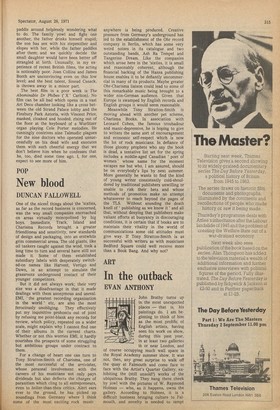POP
New blood .
DUNCAN FALLOWELL
One of the nicest things about the 'sixties, as far as the record business is concerned, was the way small companies encroached on areas virtually monopolised by big boys. Immediate, Track, Island and Charisma Records brought a greater friendliness and sensitivity, new standards of design and packaging, into an erstwhile grim commercial arena. The old giants, like oil tankers caught against the wind, took a long time to turn and several have still not made it. Some of them established subsidiary labels with desperately switched-on names like Harvest, Vertigo and Dawn, in an attempt to simulate the grassroots underground contact of their younger competitors.
But it did not always work; their very size was a disadvantage in that it made dealings with them anonymous and unreal. EMI, 'the greatest recording organisation in the world ' etc, are also the most ferociously unobliging. They effectively put my inquisitive proboscis out of joint by refusing me point-blank any records for review, which policy, repeated on a wider scale, might explain why I cannot find one of their albums in the current charts. Whether or not this worries EMI, it hardly nourishes the prospects of some struggling but ambitious groups under contract to them.
For a change of heart one can turn to Tony Stratton-Smith of Charisma, one of the most successful of the arrivistes, whose personal involvement with the careers of his musicians not only pays dividends but also deflects the charges of parasitism which cling to all entrepreneurs, even to holier-than-thou critics. Alert ears ever to the ground, he has picked up soundings from Germany where I think some of the most exciting rock music anywhere is being produced. Creative pressure from Germany's underground has led to the establishment of the Ohr record company in Berlin, which has some very weird noises in its catalogue and two outstanding bands, Ash Ra Tempel and Tangerine Dream. Like the companies which arose here in the 'sixties, it is small and reasonably coherent, although the financial backing of the Hansa publishing house enables it to be defiantly uncommercial in many of its products. Maybe greater Ohr-Charisma liaison could lead to some of this remarkable music being brought to a wider non-German audience. Given that Europe is swamped by English records and English groups it would seem reasonable.
Meanwhile Tony Stratton-Smith is moving ahead with another pet scheme, Charisma Books. In association with Leonard Cohen, the famous troubadour and manic-depressive, he is hoping to give to writers the same sort of encouragement and economic self-respect which is now the lot of rock musicians. In defiance of those gloomy prophets who say the book is dead, a tentative list set for the spring includes a middle-aged Canadian ' poet of women' whose name for the moment escapes me but who, I am assured, should be on everybody's lips by next summer. More generally he wants to find the kind of young writer consistently cold-shouldered by traditional publishers unwilling or unable to risk their bets and whose methods of promotion make no attempt whatsoever to reach beyond the pages of the TLS. Without sounding the death knell of ' publishing as we know it' and all that, without denying that publishers make valiant efforts at buoyancy in discouraging conditions, it is certain that if books are to maintain their vitality in the world of communications some old attitudes must give way. If Tony Stratton-Smith is as successful with writers as with musicians Bedford Square could well receive more than a Book Bang. And why not?


































 Previous page
Previous page